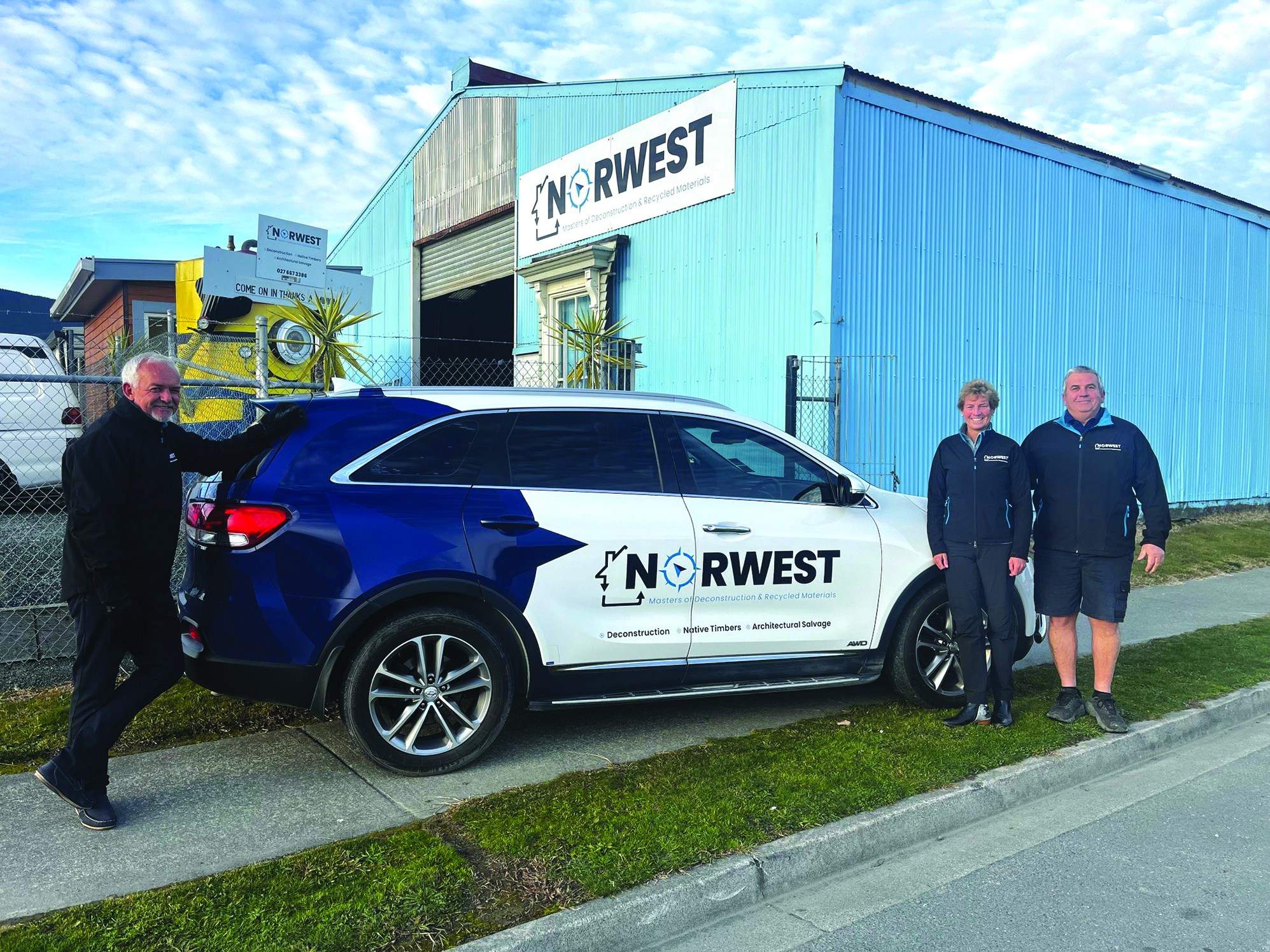Sponsored Post: The region's best-kept secret in sustainable deconstruction

The friendly team at Norwest Grant Kerr, Sonia Malpas, Andy Rankin. Photo: Supplied.
For the past 25 years, Norwest has been quietly making a significant impact in the Nelson Tasman region. Known as the only true local deconstruction and recycling company in the Top of the South, Owner Director Tony Billens is fulfilling a passion for reclaiming salvageable materials and has led Norwest with a commitment to sustainability and historic preservation. Norwest has set itself apart by focusing on deconstruction rather than demolition, embodying a philosophy of ‘demolition with a conscience’.
This method both preserves valuable materials and greatly reduces waste sent to landfills. General Manager, Grant Kerr says, “Tony has an extensive knowledge of the region's history and the iconic items people cherish from their childhood. He knows where every piece came from and finds joy in giving these items a second life. It's like believing in reincarnation," he adds. "We love hearing the stories of how people have reinvented the pieces they have purchased from us."
Demolition and construction waste currently contributes up to 50% of the materials taken to landfill so there is an enormous potential for diversion, explains Grant. With landfill fees increasing annually, recycling was becoming a more cost-competitive option to dumping and contributed to a more environmentally sustainable future. “That shift was starting to tip the balance for clients who in previous years have wanted demolition jobs completed as quickly as possible, rather than taking the time to deconstruct and recycle.”
Administration Manager Sonia Malpas says Norwest’s approach to deconstruction is meticulous and methodical. “Although it may not look like it when you see our large machinery on work sites, the process involves carefully dismantling structures to salvage materials like native timber, doors, windows, metal, concrete, wiring, insulation, roofing iron, hardware, signage and other character pieces. This careful work is performed with a deep respect for historical significance, often involving collaborations with local iwi, the Historic Trust, and the Department of Conservation.”
“When we witness buildings being “demolished” with no intent of retrieving these items we take it very personally to see such waste. However, it is not just the fault of the organisations that are demolishing buildings with no consideration for recycling and reducing the level of landfill. The industry is not regulated, anyone can knock down a building and take all materials to a landfill without even separating any possible hazardous materials. Although some form of regulation is beginning to be talked about, there is a significant amount of work that needs to be done by governing bodies in this area.”
The Norwest shop, located at Kotua Place, is open six days a week and is the region’s best-kept secret. Their reclaimed materials are available to both trade and retail sectors, making them accessible to joiners, builders, hobbyists, and DIY enthusiasts looking to add character to their projects.
As the Norwest team deconstructs a project, each piece of timber is evaluated, scanned and de-nailed, before being run through a mill and repurposed as tongue and groove boards or dressed timber for shelves and bookcases. Shop Manager Andy Rankin says their methodical approach involves several key steps to ensure maximum salvage and minimal waste. “This beautiful native dry timber, that has already stood the test of time, is over 100 years old and is given another life.”
Everything possible is repurposed or reused, and their joinery department has the ability to create laminated native timber bench tops and stunning French doors from recycled doors and recycled timber framing. “We have everything from leadlight to glass and tiles. We also have villa, colonial, character and commercial doors, along with hardware and weights for sash windows from a bygone era.”
Working on a myriad of projects including the historic buildings on Nile Street, Halifax Street and Bridge Street including the Martha Washington Building and the Ballantynes Building in Christchurch, the team have also worked on the Richmond Police Station and schools in Collingwood and Golden Bay, as well as the old Turners and Growers building on Nayland Road.
Before any work begins, a thorough assessment of a site is conducted, including identifying hazardous materials, assessing the structural integrity of the building, and determining which materials can be salvaged. This detailed planning stage is crucial for developing a deconstruction strategy that maximises efficiency and safety. Once complete, the deconstruction process begins.
One of Norwest’s standout features is its ability to handle projects of all sizes and complexities. Whether it’s a small residential property or a large commercial building, they apply the same level of care and attention to detail. This versatility has made them a trusted partner for a wide range of clients, from homeowners to developers.
The company continuously seeks out new and innovative ways to reduce their environmental impact. With a strong foundation built on sustainability, historical preservation, and community engagement, Norwest is leading the way in deconstruction. As more people become aware of the benefits of deconstruction, rather than demolition, the demand for their services has grown. They are not only reducing waste and preserving valuable materials but also keeping the history and memories of the region alive.
